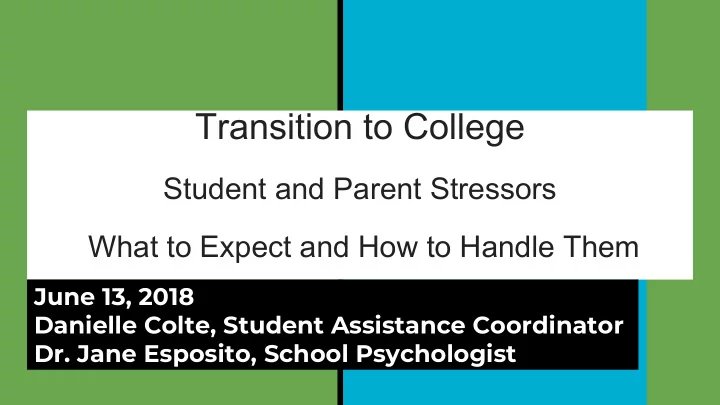

Transition to College Student and Parent Stressors What to Expect and How to Handle Them June 13, 2018 Danielle Colte, Student Assistance Coordinator Dr. Jane Esposito, School Psychologist
Going to college is more than just "going back to school.” A significant milestone in the life of a family. It is a time of separation and transition, requiring an adjustment on the part of parents, the college-bound teenager and the whole family.
Separation and Change for Parents and Students College Decision Day has passed. What to expect next? Many transitions ahead. Transition to college for students (i.e (being away from home, making new friends, new responsibilities, meeting expectations, time management) Transition to college for parents (i.e empty nest syndrome, worry about their child being away from home, relinquishing control, feeling left out)
College Students Stress Levels On the Rise Adjusting to college life The increased number of students feeling stressed has been accompanied by an increase in utilization of mental health and counseling services; one institution reported a 29% increase in the use of counseling and psychological services in the last four years and another reported that 40% of the first-year students visit their counseling center. 4
College Student Pressures The college freshman will be confronted with social situations - sex, drugs and alcohol. Students are feeling increasing pressure to know what they want to do, pick a career path and plan for their futures. This pressure is causing unfortunate substance abuse, anxiety and even depression.
Challenges for College Student Fitting in - It can be stressful to analyze new social norms, learn a new ➢ set of behaviors, and consider adopting a particular identity and group affiliation. The opportunities can be exhilarating, but the choices should not be made hastily. Balancing socializing and working - College offers an assortment of ➢ opportunities for advancement and distraction - there are so many potential friends, parties, courses, things to do and places to go. Not knowing what direction is best and not wanting to miss out on anything, students often try to be included in everything.
What the college student can do Explore new interests, discover .new place, and meet new people. Before committing to any one group or trend, students should take their time getting to know other students Participate and prioritize. No one can do everything. Be patient. Evaluate the fit.
Knowing when help is needed Students often doubt their ability to handle their course work and may be bothered by new and unexpected feelings, precipitating a downward spiral. There is also an increased risk of certain disorders in the teen and young adult years (e.g. depression, manic depressive illness and anorexia). Students may find themselves seeking out a mental health professional for the first time. The right help at the right time can prevent problems from snowballing.
Never ignore a problem. Both academic and emotional challenges are most successfully managed ● early when small. Know where to turn for help - Almost all institutions of higher learning ● provide a school counseling and/or wellness center where students can seek confidential guidance and advice from a variety of sources. (i.e college counselor, academic advisor, religious counselor or clergy member, team coach, primary care practitioner, resident advisor, house master, sorority mom, etc.)
Challenges for parents Feeling a void - Feelings of emptiness characterize this stage of separation - there is vacant time and cleaned-out rooms. Parents may feel unprepared or uncomfortable without their roles as primary caretaker and protector. Feeling left out - Adjusting to being on the outside can be difficult when parents are no longer needed in the same ways. Parents are less privy to every aspect of their child's life; they no longer know the details of their son's or daughter's whereabouts. Relinquishing control - It is necessary to give up some parental control. Whether it's giving advice about selecting courses or drinking, parents have to come to realize that young adults must make their own decisions. Relationships grow and change as children grow and change.
What parents can do Redirect time and energy previously focused on the child ❏ Address individual needs. Parents should investigate and inquire about available ❏ resources. Arranging for necessary services for a student with a learning disability, mental illness or physical condition should be done preventively. In the event of a crisis, it is preferable to support the student's own coping and ❏ problem-solving abilities rather than to rush in as savior, however difficult it is to hear cries of distress. Guide rather than pressure. ❏ Determine appropriate expectations and guidelines and be explicit (i.e financial ❏ obligations, weekly calls, home visits). Allow for mistakes. ❏
Last minute advice Expect ups and downs Expect that there will be moments when things are going great and then all of a sudden not so great. Be prepared to know who to reach out to and stay calm. Things can always be worked through. Stay connected Little things do count.. Cards sent home, care packages sent to school, pictures of events that were missed, and facetime, texts and e-mail provide a way to stay connected and involved.
Recommend
More recommend